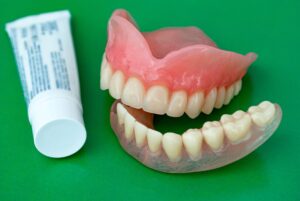
changed for the better; rejuvenated
 25 NEW CHARDON STREET • BOSTON, MA • 02114
25 NEW CHARDON STREET • BOSTON, MA • 02114

If you’ve suffered from tooth loss, dentures are a great way to restore your ability to eat and speak more normally. That said, these artificial teeth are somewhat infamous for becoming loose over time as your jawbone weakens. Fortunately, denture adhesives can create a stronger bond between the acrylic base and your gums so that you don’t have to worry about them falling out of place. If you’re not sure how to use these products, keep reading to learn more about them!
Denture adhesives, or glues, refer to the various options that help to temporarily attach your restoration to your gums. These products form a seal that prevents unwanted particles from penetrating the area between your artificial teeth and your natural ones and results in a day-long hold. There are several types including creams, powders, and strips so that it’s easy to find an option to meet your needs.
First, you should ensure that your restoration is clean because otherwise the hold will be compromised. Brush and rinse your dentures gently with a soft-bristled brush to eradicate any leftover food particles or unwanted germs.
Then, depending on the type you’re using, you can squeeze, sprinkle, or place the product on the surface of your dentures where they touch your ridges. There should be specific instructions included in the packaging that tell you how much to use and whether it needs to be put in a certain spot. Then, insert your dentures into your mouth gently and bite down firmly for a few moments to allow the bond to form.
Your body begins to reabsorb bone mass after teeth go missing because the strength is no longer required to support your pearly whites. This causes the shape of your jaw and face to shift enough that your dentures, which once fit like a glove, start to wiggle in place or become dislodged. Glues can be used to create a firmer connection, ease discomfort, and alleviate anxiety over potential embarrassment.
They can also be particularly helpful if you have dry mouth due to certain medical conditions or medications that impact your saliva production. Without enough moisture, your artificial teeth won’t form the tight suction that’s needed to keep them in place. Those who often put added strain on their face like singers, teachers, or athletes also can benefit from using adhesives.
Although they can be incredibly helpful in many instances, there are some instances in which denture glues may not be the right solution, including:
If you’re not sure if it’s time to get new dentures, schedule an appointment with your dentist. They’ll examine your mouth and restoration to let you know the best next steps!
At Kraft & Schrott Dental Associates, you and your family benefit from a team of experts who offer a wide range of services all under one roof, including dentures. They’re dedicated to providing top-quality oral care in a calm and comfortable environment to soothe any anxiety you may have over dental visits. Using advanced technology they can quickly and accurately spot any areas of concern and suggest individualized solutions. If your dentures aren’t fitting like they used to, you’re welcome to request an appointment on the website or by calling (617) 227-4924.
No comments yet.
RSS feed for comments on this post.
Sorry, the comment form is closed at this time.